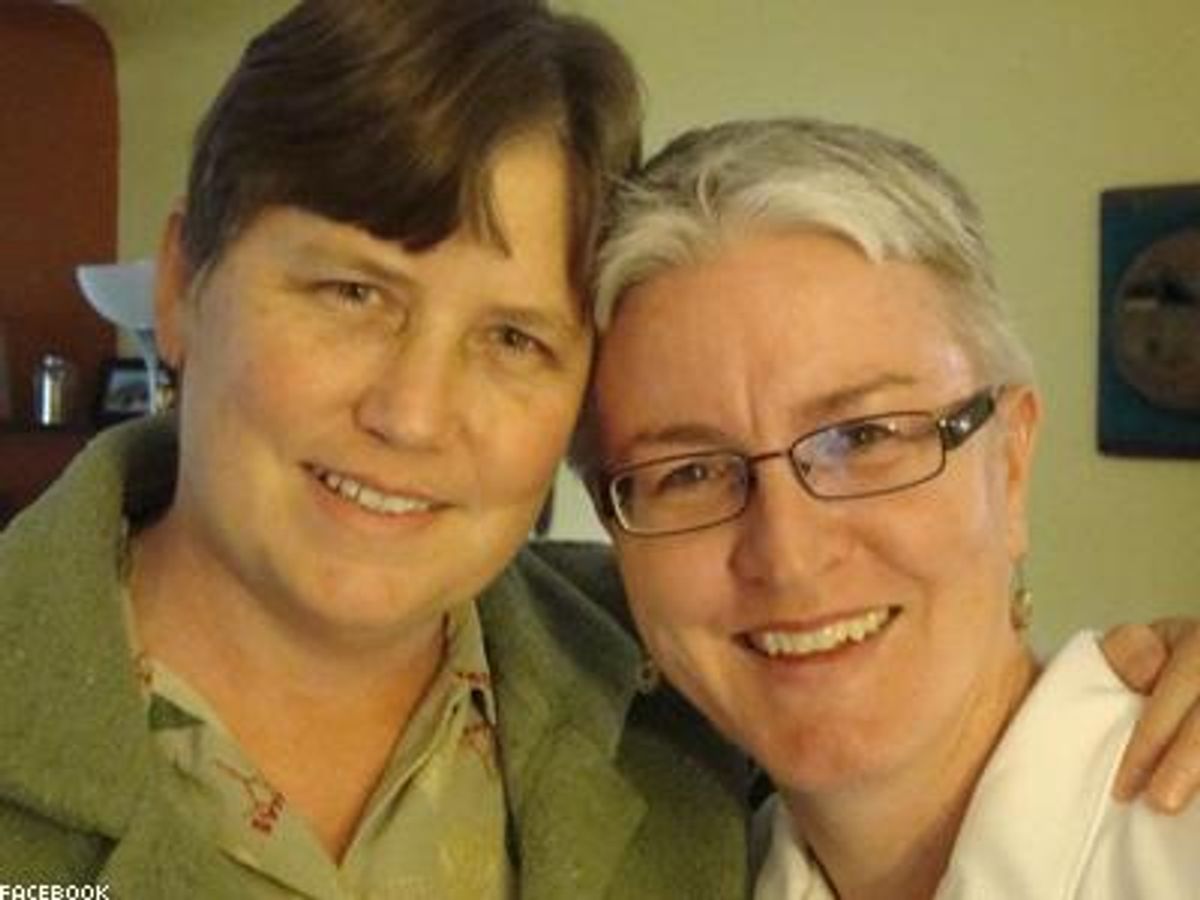A federal judge ruled today that Colorado's 2006 voter-approved ban on same-sex marriage violates the Equal Protection and Due Process clauses of the U.S. Constitution. The decision was accompanied by a temporary stay until August 25, meaning same-sex couples in Colorado cannot marry until that time. The ruling did not address the continued issuance of marriage licenses to same-sex couples by a Boulder County clerk.
U.S. District Judge Raymond P. Moore, an appointee of President Obama, granted the plaintiffs in Burns v. Hickenlooper -- six same-sex couples either denied marriage licenses in Colorado or denied recognition of their out-of-state marriages -- a preliminary injunction that essentially stops the state from enforcing its current marriage laws.
"The Court agrees with the analysis in [Utah's] Kitchen and [Oklahoma's] Bishop that marriage is a fundamental right and that the Challenged Laws impermissibly infringe upon that right," writes Moore.
The judge declined to grant the state's request to stay his decision until the U.S. Supreme Court potentially decides Kitchen v. Herbert, a similar case seeking marriage equality in Utah, which is encompassed in the same federal appeals district as Colorado.
However, Judge Moore did grant a temporary stay of his order, giving the state of Colorado until 8 a.m. August 25 to petition the 10th Circuit Court of Appeals for a broader stay pending appeal. In his 12-page decision, Moore notes that the named defendants -- Republican attorney general John Suthers and Democratic governor John Hickenlooper -- have taken a "non-opposition" approach, with the attorney general "orally [conceding] at the July 22, 2014 hearing that if the Kitchen decision is upheld or becomes final, the Challenged Laws are unconstitutional."
Moore's ruling is notably critical of the mixed messages from various courts regarding whether or not stays are to be issued in cases seeking marriage equality, when a judge has found in favor of the same-sex couples filing suit but expects state officials to appeal that decision. The ruling details recent stays granted in the Kitchen case as well as another federal case stemming from that litigation in Utah, plus rulings in Idaho and Oklahoma, where stays have been granted intermittently by district courts, appeals courts, or the U.S. Supreme Court.
"Based on the most recent stay, it appears to the Court that it may well be that a message is being sent by the Supreme Court," writes Moore. "But this Court is not some modern day haruspex skilled in the art of divination. This Court cannot -- and, more importantly, it will not -- tell the people of Colorado that the access to this or any other fundamental right will be delayed because it 'thinks' or 'perceives' the subtle -- or not so subtle --content of a message not directed to this case. The rule of law demands more."
Interestingly, Judge Moore's ruling cites the recent Supreme Court decision in Hobby Lobby, specifically as it pertains to the "immediate, irreparable" harm that can be done by a court not issuing an injunction when constitutional rights are at risk.
Moore's decision also makes clear that he believes the plaintiffs will ultimately be successful in striking down the state's discriminatory marriage policies, since "it is Plaintiffs who have shown a likelihood of success on the merits; it is Plaintiffs who suffer irreparable harm if Colorado's unconstitutional same-sex marriage ban is not enjoined; and it is Plaintiffs to whom the balance of harm and the public interest favor."
Today's ruling marks the 27th consecutive pro-equality ruling from a federal or state court since the U.S. Supreme Court struck down the federal Defense of Marriage Act in its landmark ruling in U.S. v. Windsor last summer. Earlier this month, a state judge issued a similar ruling finding Colorado's ban on same-sex marriage unconstitutional.
LGBT groups applauded today's decision as a sign of the unstoppable momentum of nationwide marriage equality.
"Today, Judge Moore affirmed what Adams County District Court Judge C. Scott Crabtree, the justices of the 10th Circuit Court, and dozens of other judges nationwide have decided: marriage bans are unconstitutional," said Wendy Howell, state director of Why Marriage Matters Colorado, a broad coalition working to secure equal marriage rights for all committed Colorado couples. "We applaud his ruling as another step forward for equality, and we continue to call upon Attorney General John Suthers to drop his wasteful defense of Colorado's unconstitutional ban. Republican governors in New Jersey, Pennsylvania, and Nevada have all decided to stop wasting taxpayer dollars continuing to defend indefensible bans in their states. Here in Colorado, real couples are hurt every day that they are denied the ability to marry, and there is no justifiable reason to prolong that pain. Therefore, we again call upon Suthers to drop his appeals and let the rulings stand."
"Today's ruling from Judge Moore provides even further confirmation that Colorado's ban on marriage equality is unconstitutional," said Human Rights Campaign legal director Sarah Warbelow in a statement. "Through civil unions, Colorado has already recognized the need for same-sex couples to have equal access to the benefits and obligations of marriage. Now it's time for the state to stop its appeal and allow these families the dignity that comes with full marriage equality."















































































